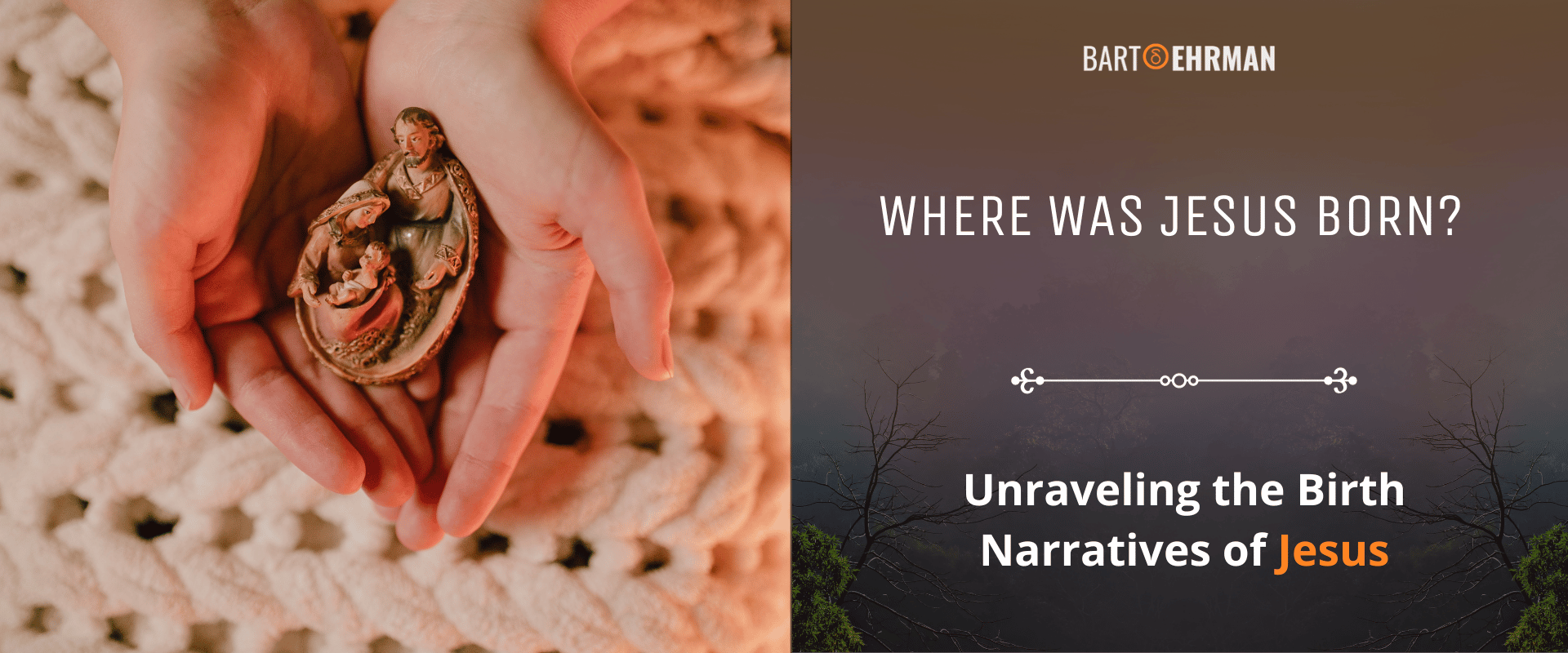Where Was Jesus Born? Unraveling the Birth Narratives of Jesus

Written by Marko Marina, Ph.D.
Author | Historian
Author | Historian | BE Contributor
Verified! See our guidelines
Verified! See our editorial guidelines
Date written: October 16th, 2023
Disclaimer: The views and opinions expressed in this article belong to the author and do not necessarily match my own. - Dr. Bart D. Ehrman
Years ago, in the hushed reverence of a middle school religious class, I asked my teacher what then seemed like a simple question: Was Jesus really born there? With authority, she proclaimed, "We know he was born there."
The "there" she referred to was Bethlehem, the revered birthplace of Jesus. At that moment, I quietly accepted her answer, much like countless others have for generations.
However, the sands of time have a way of shifting perceptions and knowledge. Only later, as the years passed and my quest for understanding deepened, I discovered the complexity beneath the question of “Where was Jesus born?”
What is the birthplace of Jesus? This inquiry will lead us into the early Christian world where the story of Christmas and modern scholarship converge. Buckle up, for this intellectual exploration will challenge preconceptions and long-held beliefs.

Jesus’ Birth: An Overview of the Sources
How do historians establish what happened in the past? By looking at the sources. The question of where Jesus was born, therefore, has to start with a general introduction to the nature of our surviving sources.
If we want to know where Jesus was born, we have to look at the New Testament Gospels. They are, generally speaking, our best sources for Jesus’ life. Most historians agree about the chronological order of the Gospels: Mark wrote first and John last.
“They are faith-based documents. You can’t use them as evidence for the historical Jesus”. If I had a penny every time I heard this, I would be rich. But the authors of the four Gospels didn’t know that they were writing the Bible.
When the author of Matthew decided to write his Gospel, he didn’t know he was writing the New Testament. Instead, he was writing an account of Jesus’ life - probably for his community. It was only decades or even centuries later that Christians canonized the Gospels. So, the New Testament Gospels are valuable as historical sources.
However, they are also problematic. The reliability of the Gospels is a complicated topic that depends on several key issues. These issues come into play every time we raise the question of where Jesus was born.
Here, I can only give a short and simple version of the historical problems that the Gospels present. Later on, we’ll see how these problems are intertwined with the issue of Jesus’ birthplace.
It’s no surprise, therefore, that we find numerous discrepancies within the New Testament Gospels!
Have you ever wondered how many discrepancies there are? Do you think that the Bible contains no historical error at all? Check out Dr. Ehrman’s best-selling book “Jesus Interrupted” and find out the surprising truth!
Birthplace of Jesus: A Scholarly Analysis
Where was Jesus born in the Bible? Both the earliest (Mark) and the latest New Testament Gospel (John) don’t mention Jesus’ birth at all.
However, Matthew (1:18-2:23) and Luke (2:1-21) do. They give us two narratives and they both indicate that Jesus was born in Bethlehem. And where is Bethlehem? It’s located about 6 miles south of Jerusalem.
However, if we take these two accounts from a historical perspective, we’ll uncover serious problems. We can divide these problems into two broad categories:
Did You Know?
A Spanish philologist known as "El Brocense" (16th century) was among the first to openly criticize the infancy narratives - especially as they were depicted in medieval art. Soon he found out about the dangerous road he took. His students reported him to the infamous Spanish Inquisition!
Where was Jesus Born? Luke’s Infancy Narrative
Let’s start with the Gospel of Luke. The story of Christmas in Luke begins with an annunciation to Mary who is living in Nazareth. Angel Gabriel informs her that she will bear the Son of God. Then, all of a sudden, Mary and Joseph had to make a trip from Nazareth to Bethlehem.
Why? Because the emperor Augustus instituted an empire-wide census.
Everybody had to register by going to their ancestral home. As it turns out, Joseph was from the line of King David - a Jewish ruler who lived a thousand years earlier. Since David’s hometown was Bethlehem, Joseph and Mary had to go there.
While in Bethlehem, Mary goes into labor. Since there was no room for them in καταλύματι (a word that usually is translated as the “inn”), they laid the child in a cattle manger.
Eight days later, they had Jesus circumcised. And since they are close to Jerusalem, 32 days after Jesus’ birth, his parents went to the Temple and performed the offering for Mary’s ritual cleansing (Lev. 12:1-8). After that, Mary, Joseph, and baby Jesus returned to Nazareth.
Where was Jesus from? According to Luke, Jesus was raised in Nazareth but was born in Bethlehem.
Luke’s Census: An Event That Never Happened
Luke’s Christmas story is filled with historical problems. The idea that there was an empire-wide census at the time of Augustus is implausible. We have good sources for his reign and in none of them is there any account at all of an empire-wide census. To be honest, I don’t know of any empire-wide census in the history of the ancient world.
Furthermore, the exact details of Luke’s census don’t make any sense. He tells us that people had to return to their ancestral homes to register. Could you imagine a massive migration within the whole Empire without any record in Greco-Roman sources? And how would that work anyway? How would people know where to go?
In The Rise of Christianity, E. W. Barnes concludes: “If any such census had been taken, the dislocation to which it would have led would have been worldwide. Roman historians would not have failed to record it.”
Additionally, Luke asserts that this census happened when Quirinius was the governor of Syria. We know about a governor of Syria named Quirinius. But he was a governor 10 years after Herod’s death! In the Gospel of Luke, Jesus was born during Herod’s reign. That, of course, creates an unsolvable contradiction.
So, you can see the dilemma.
Luke knew Joseph and Mary were from Nazareth but he believed that Jesus had to be born in Bethlehem. Why? Because of the Old Testament prophecy about a Savior from Bethlehem. Consequently, Luke developed a complicated plot to get Jesus born there. The main tool he used was this fictional empire-wide census.
Bethlehem, Wise Men, and Herod: Matthew’s Account
The birthplace of Jesus in Matthew is the same, but the specific details of the narrative are not. There is no trip to Bethlehem in Matthew’s version. Mary and Joseph are living there. After Mary got pregnant, Joseph wanted to leave her. However, he learned in a dream that the child was conceived by the Holy Spirit. So, Jesus was born in Bethlehem.
Then Matthew introduces the Wise men who are following the star that should lead them to the place where the new king of the Jews was born. Arriving in Jerusalem, they inquire about the exact birthplace. Herod the Great finds out about it and asks his Biblical scholars for advice.
They tell him that Scripture predicts that a child will be born in Bethlehem. Herod tells the wise man what he knows and asks them to return to him when they find the child because he also wants to worship the new king. However, this is all an evil plot. Herod, of course, wants to kill baby Jesus to secure his position.
The star, then, reappears and guides the wise man to the house where Jesus was born. They worship him and then go back through a different route - away from the evil king. Herod wasn’t pleased with their deception. He sends out soldiers to kill every male child two years and under.
But through another dream, Joseph finds out about his plan. Aware of the looming danger Mary, Joseph, and baby Jesus escape to Egypt.
After Herod died, Joseph wanted to return to Bethlehem, but couldn’t. Herod’s son Archelaus was now a king there. And he was even worse than his father. Consequently, the family was forced to relocate to Nazareth.
Where did Jesus’ birth take place? Matthew asserts it happened in Bethlehem and then his family moved to Nazareth where he was raised.
However, Matthew’s account contains improbable elements as well. Take, for instance, the guiding star. How would that even work? How could a star point to a specific house? If you don’t believe me, try to estimate which star is right above your neighbor's house.

Matthew and Luke: A Comparative Look
Besides the internal problems, these two accounts contain discrepancies and actual contradictions. I will emphasize the one that strikes me as the most obvious one:
What is Mary’s and Joseph’s hometown?
In Matthew’s story, it appears to be Bethlehem. The wise men worshiped Jesus in a house. It was a house that Joseph and Mary lived in. There is no mention of a stable or an inn. Furthermore, when Joseph wanted to return from Egypt, his first choice was Bethlehem. Of course, it was. The Bethlehem was, in Matthew’s version, his hometown.
However, Luke disagrees! In his account, Joseph and Mary are from Nazareth. The only reason why they ended up in Bethlehem was the empire-wide census. Soon after Jesus’ birth, the happy family returned to Nazareth.
Where Was Jesus Born? A Scholarly Answer
Why are these two accounts filled with contradictions and improbable elements? Matthew has an answer. He quotes the Old Testament prophecy (Micah 5:2) that the Savior will come from Bethlehem. Both Matthew and Luke wanted to place Jesus’ birth there because of that prophecy.
These are theologically driven accounts that are not interested in the historical truth. They want to emphasize a theological point. Even Jesus’ birth was a sign of his Messianic identity. After all, he was born where the Savior is predicted to be born. But, in reality, he wasn’t.
Where was Jesus born? Most scholars believe that Jesus’ birthplace was Nazareth. In The Historical Jesus, Helen Bond gives a clear conclusion: “Jesus was born in Nazareth, the small Galilean village where he grew up. Such a conclusion is generally held by most historical Jesus critics.”
When was Jesus born? The New Testament only gives indications, not a clear date. Based on Matthew and Luke, we can conclude that Jesus was born during the later years of Herod’s reign. That would put his birth between 7 and 4 B.C.E.
How can Jesus be born before the common era? As it turns out, one person is to be blamed. Even the Pope admitted that the whole Christian Calendar is based on a mistake made by a 6th-century monk Dionysius Exiguus.
Summing up Conclusions: Jesus’ Birth
Where was Jesus born? While tradition may have whispered Bethlehem's name in our ears for generations, the insights of modern scholarship have shifted our perceptions. Just as I once sat in that middle school classroom, entrusting my beliefs to an authoritative answer, I now stand before you, having ventured deep into the heart of the matter.
Modern scholarship suggests that the most likely birthplace of Jesus wasn’t in the shadow of Bethlehem's starry skies but in the town of Nazareth. This conclusion, I have to say, isn't a rejection of faith. It's an embrace of the pursuit of knowledge and the recognition that history can be as complex as it’s captivating.
Do you want to dig deeper into the world of early Christianity? Join Bart Ehrman’s exceptional course “Jesus the Secret Messiah” and find out more about the way modern scholarship analyzes our earliest written Gospel! Click the link below and embark on a fascinating intellectual journey!
